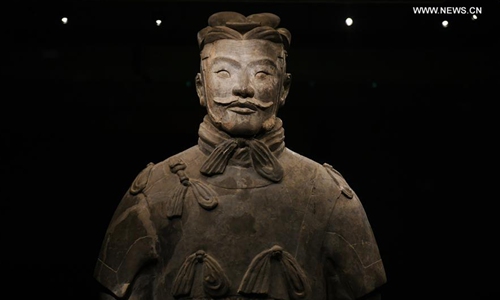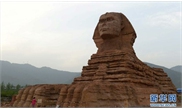
Photo taken on Dec. 5, 2019 shows a terracotta warrior displayed at Mausoleum of the First Qin Emperor Museum in Xi'an, northwest China's Shaanxi Province. (Xinhua/Li Yibo)
Authorities in Northwest China's Shaanxi Province, where the UNESCO World Heritage site of the Mausoleum of the First Qin Emperor Museum is located, has vowed to ban the fake Terracotta Warriors tourist spots that have been seen near the museum, confusing domestic and international tourists for a long time.The man-made fakes not only damage the image of actual Terracotta Warriors, but also disrespect Chinese history and culture, the Shaanxi Provincial Cultural Heritage Administration told the Global Times, saying that they must be prohibited by laws and regulations.
The administration recently drafted a suite of amendment regulations on the protection of the Mausoleum of the First Qin Emperor. It was released by the local justice authority last week and is open for public consultation, enforcing the ban of man-made scenic spots that may "distort or damage the authenticity of the Mausoleum of the First Qin Emperor."
The amendment ensures that building or operating fake tourist attractions related to the museum and its Terracotta Army is illegal and will result in punishment, said an official surnamed Li, who participated in the drafting of the amendment.
"The Terracotta Warriors are a spiritual symbol of Chinese civilization," Li told the Global Times on Wednesday. "We have the responsibility to protect the integrity of its historical features, and 'say no' to copycats," the official added.
In fact, the issue surrounding fake tourist spots has existed around the museum for years, members of the public claim. On China's social media platform Sina Weibo, many Chinese users complained about the fake Terracotta Warrior tourist sites they were taken to by local cheaters.
One user recalled his unpleasant experience in 2015: "I told the taxi driver to drive me to the Mausoleum of the First Qin Emperor, but he drove to a so-called newly-discovered site, where the Terracotta Warriors were merely low-quality modern copies painted with bright colors," he wrote.
The fraud could happen to foreign tourists as well. In an article published on an English travel guide website, international tourists were reminded to be cautious of the fake Terracotta Army. "Ignore those 'kind' guys hanging around the parking lot and claiming they can lead you to the entrance," it said.
The local government had to destroy more than 40 fake Terracotta Warriors in 2017 in response to complaints by tourists, thepaper.cn reported. However, fake tourist spots continue to reemerge near the real site, misleading visitors from around the world.
The museum itself hasn't been able to crack down on any surrounding locations, said one staffer at the museum, surnamed Wang.
"We have no law enforcement power," Wang told the Global Times on Wednesday, adding that he is looking forward to the upcoming ban on fake tourist sites.
The local government will establish a development control area for the museum based on China's Cultural Relics Protection Law, Li said. Constructions that may damage the museum's historical features, such as the fake Terracotta Army tourist spots, will be prohibited from the designated area, she added.
The exact size of the area is under discussion. "Maybe 56 square kilometers," Li said.


